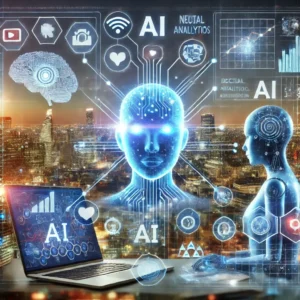In the dynamic world of business, staying ahead of the curve is crucial for maintaining competitiveness. One of the most powerful tools enabling businesses to achieve this edge is artificial intelligence (AI). The integration of AI into marketing strategies is not only transforming how companies interact with customers but also reshaping the entire marketing landscape. Here’s why the fusion of AI and marketing is essential for modern businesses.
1. Personalization at Scale
One of the most significant benefits of AI in marketing is its ability to deliver personalization at scale. In the past, marketing campaigns were often broad and impersonal, targeting large demographic groups rather than individuals. AI-driven tools allow businesses to analyze customer data and predict individual preferences, enabling marketers to deliver hyper-targeted campaigns.
For example, AI can process data from customer behavior, such as past purchases or online interactions, to offer personalized recommendations or tailor emails specifically to a consumer’s interests. This level of personalization fosters stronger customer relationships, increases engagement, and boosts conversion rates.
2. Data-Driven Decision Making
Marketing is becoming increasingly data-centric, and AI is a crucial ally in making sense of massive data sets. AI algorithms analyze customer behavior, market trends, and competitor activities, providing valuable insights that help marketers make informed decisions. This data-driven approach leads to more effective campaigns, better resource allocation, and higher return on investment (ROI).
AI doesn’t just provide insights; it also continuously learns and adapts, offering real-time updates and enabling businesses to stay agile in a fast-paced market. The ability to predict customer behavior, identify emerging trends, and optimize marketing strategies in real-time is invaluable for companies looking to stay ahead of their competition.
3. Enhanced Customer Experience
AI technologies like chatbots, virtual assistants, and voice search are revolutionizing the way businesses interact with their customers. These tools provide 24/7 customer support, answering queries, and resolving issues promptly. AI-driven chatbots not only improve the speed and accuracy of customer service but also gather data that helps businesses understand their customers better.
Voice search and AI assistants, such as Amazon’s Alexa or Google Assistant, are changing how consumers find information and interact with brands. Marketers can leverage these platforms to enhance customer experience, providing seamless, conversational interactions that are more aligned with how customers prefer to engage.
4. Predictive Analytics and Lead Scoring
Predictive analytics, powered by AI, is helping marketers anticipate customer needs and behaviors before they happen. This enables businesses to forecast demand, identify potential leads, and nurture those leads more effectively. AI can analyze patterns in consumer data and predict which customers are more likely to convert, allowing sales teams to focus their efforts on high-quality leads.
Lead scoring models, enhanced by AI, are far more accurate and efficient than traditional methods. This increases the productivity of sales teams and enhances marketing campaigns by ensuring that the right message reaches the right audience at the right time.
5. Automation of Repetitive Tasks
AI allows marketers to automate a wide range of repetitive tasks, such as email marketing, social media posts, and ad bidding. This saves time, reduces errors, and allows marketers to focus on more strategic and creative aspects of their campaigns. Automated systems can also manage ad campaigns in real-time, adjusting bids and placements to maximize results.
AI-powered tools like predictive email automation can even determine the optimal times to send messages to individual customers, further increasing engagement and conversion rates. As a result, marketing teams can do more with less effort, driving efficiency and effectiveness.
6. Optimized Content Creation
Content is king in the world of marketing, but creating engaging, relevant content consistently can be challenging. AI is assisting in this area by helping marketers generate content based on consumer interests and preferences. AI tools like natural language processing (NLP) can analyze large volumes of content and suggest topics, keywords, or even draft articles, saving time and improving the relevance of the content produced.
Additionally, AI can optimize content distribution, ensuring that the right message reaches the right audience through the right channels. It allows marketers to experiment with different content formats and messaging to identify what resonates most with their audience
7. Cost Efficiency and Higher ROI
By automating tasks, optimizing ad spend, and providing data-driven insights, AI significantly enhances cost efficiency in marketing. AI tools can monitor campaigns in real-time, adjusting them on the fly to maximize ROI. This reduces wasted spend on ineffective strategies and ensures that every marketing dollar is used as effectively as possible.
Moreover, AI-driven insights lead to more targeted marketing, meaning businesses can invest in channels and tactics that truly work, reducing trial-and-error costs.
Conclusion: AI is the Future of Marketing
The integration of AI with marketing isn’t just a trend—it’s a fundamental shift in how businesses operate. From delivering personalized experiences to automating repetitive tasks and driving more informed decision-making, AI is reshaping marketing at every level.
As businesses continue to evolve, those that embrace AI will not only stay competitive but also lead their industries. In an era where customer expectations are higher than ever, AI provides the tools needed to meet and exceed those expectations, driving growth, engagement, and long-term success.


